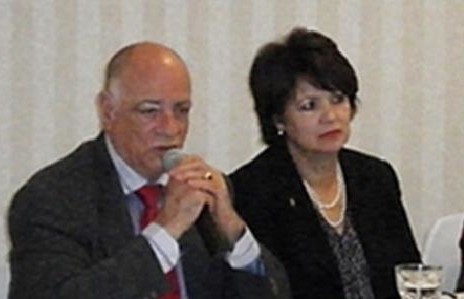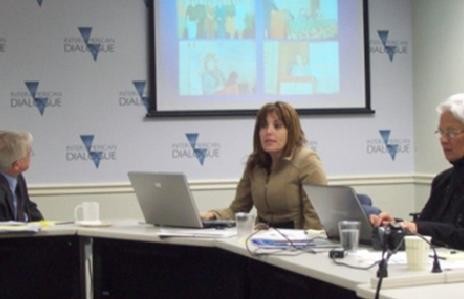
National Conference on Teacher Policy in Costa Rica
Workshop that seeks to promote debate on teacher policy and showcase innovative policies.
In Latin America, the rise of so-called “outsiders” with anti-system or anti-establishment agendas has had significant consequences for the rule of law. Alberto Fujimori in Peru, Hugo Chávez in Venezuela, Nayib Bukele in El Salvador, Donald Trump in the United States, and Jair Bolsonaro in Brazil have all left lasting impacts on their countries post-inauguration.
While Javier Milei’s candidacy in Argentina underscores the ongoing risks for democracy associated with this strategy, Bernardo Arévalo’s bumpy road to the presidency of Guatemala offers an alternative. Arévalo’s journey shows that it is possible to challenge the status quo without undermining the rule of law. Should Arévalo assume office on January 14, he could play a vital role in repairing the damage inflicted upon Guatemalan democratic institutions, bringing a breath of fresh air to a region where democratic backsliding has become the norm.
Arévalo ran on promises to combat corruption and strengthen democratic institutions, amid widespread mismanagement and deliberate attempts by those in power to manipulate the electoral outcome. He made it to the second round probably because no poll had expected him to win. Otherwise, he would have been disqualified, like every other candidate who challenged the status quo and gained traction in the polls. His surprising victory on August 20 offered Guatemalans a genuine choice, where they could vote for their preferred candidate rather than against someone or settling for the lesser of two evils. This is quite exceptional in Latin America.
Arévalo’s internationally recognized win has unsettled those in power, leading to intensified efforts by Attorney General Consuelo Porras, a key figure in the “Pact of the Corrupt,” as Guatemalans refer to the network of politicians and their supporters running the country, to prevent him from taking office. Troubling actions include arbitrary attempts to suspend Arévalo’s party, Semilla; an arbitrary raid on Guatemala’s top electoral tribunal to open and confiscate ballot boxes; and a request to lift immunity from prosecution of Supreme Electoral Tribunal’s judges who upheld electoral results.
In response, a remarkable show of unity has unfolded in Guatemala, with indigenous authorities, students, workers, and civil society joining forces to protest these attempts. (After over a week of peaceful demonstrations, the situation escalated as masked infiltrated individuals incited violence and set fires). The Supreme Electoral Tribunal has attempted to prevent the attorney general’s efforts. Key private sector actors have called on authorities to accept electoral results. This collective action is a testament to Guatemalans’ resilience and commitment to upholding democracy when confronted by corrupted power structures.
For Central America, Arévalo’s presidency offers a glimmer of hope in a region plagued by authoritarianism. In Nicaragua, the Ortega-Murillo dictatorship continues its repressive campaign to suppress civic space, most recently by seizing properties belonging to political prisoners and exiled dissidents, who were earlier stripped of their nationality. In El Salvador, the Bukele government has consolidated its power by taking control over the Attorney General’s Office and the Supreme Court Constitutional Chamber, while implementing punitive security policies resulting in widespread human rights violations under an ongoing state of emergency. In Honduras, President Xiomara Castro, despite promising much-needed human rights and anti-corruption reforms, has failed to meaningfully deliver.
With Arévalo in office, the Biden administration would have a reliable interlocutor to strengthen the rule of law, marking a significant shift in US-Central America relations. Likely driven by a combination of genuine commitment to democracy and a desire to address the migration wave heading northwards, the US government has invested millions of dollars in democracy initiatives in these countries. It is no coincidence that in recent meetings with Arévalo in Washington, DC, senior US officials expressed their unwavering support for him and highlighted the undemocratic efforts to obstruct a peaceful transition of power.
Regional support for Arévalo is growing, with countries across the ideological spectrum expressing their backing, including Argentina, Canada, Colombia, Chile, Brazil, Costa Rica, Ecuador, El Salvador, Paraguay, and Mexico. The Organization of American States (OAS) held a special session of its Permanent Council to undertake a collective assessment of the situation in Guatemala, during which Secretary General Luis Almagro presented his report after an observation mission that is part of a process to “facilitate a national dialogue.” Arévalo has called actions by the attorney general a coup and urged the OAS to invoke the Inter-American Democratic Charter. The European Union (EU) has also warned that actions undermining election results could affect Guatemala’s relations with the EU.
Concerned international actors must bear in mind that the Guatemalan people’s will is at risk if the attorney general continues to abuse her powers to undermine democracy. While President Giammattei has accepted election results and expressed willingness to transfer power to Arévalo, he has refrained from questioning the attorney general’s actions claiming a lack of authority to request her resignation, despite calls from various democratic actors in the country. Porras was appointed in 2022 after a process marred by multiple attempts to undermine the independence and fairness of the nominating commission. The international community must urge Giammattei not to remain neutral indefinitely.
The stakes are exceptionally high. If Arévalo takes office, he will have a remarkable opportunity to overhaul democratic institutions. Success would not only greatly benefit the rule of law in Guatemala, but also send a powerful message, beyond its borders, that liberal democracy remains a viable choice in the Northern Triangle and demonstrate Latin Americans that is possible to challenge the status quo while upholding democratic values.
In Guatemala, a Presidential Transition or a “Slow-Motion Coup”?
What Will Arévalo’s Presidency Mean for Guatemala?
Workshop that seeks to promote debate on teacher policy and showcase innovative policies.
PREAL reviews broad spectrum of its activities and discusses priorities for improving education policy in the coming year.
Summary of PREAL’s recent international conference on teacher effectiveness, held in Guatemala City.
